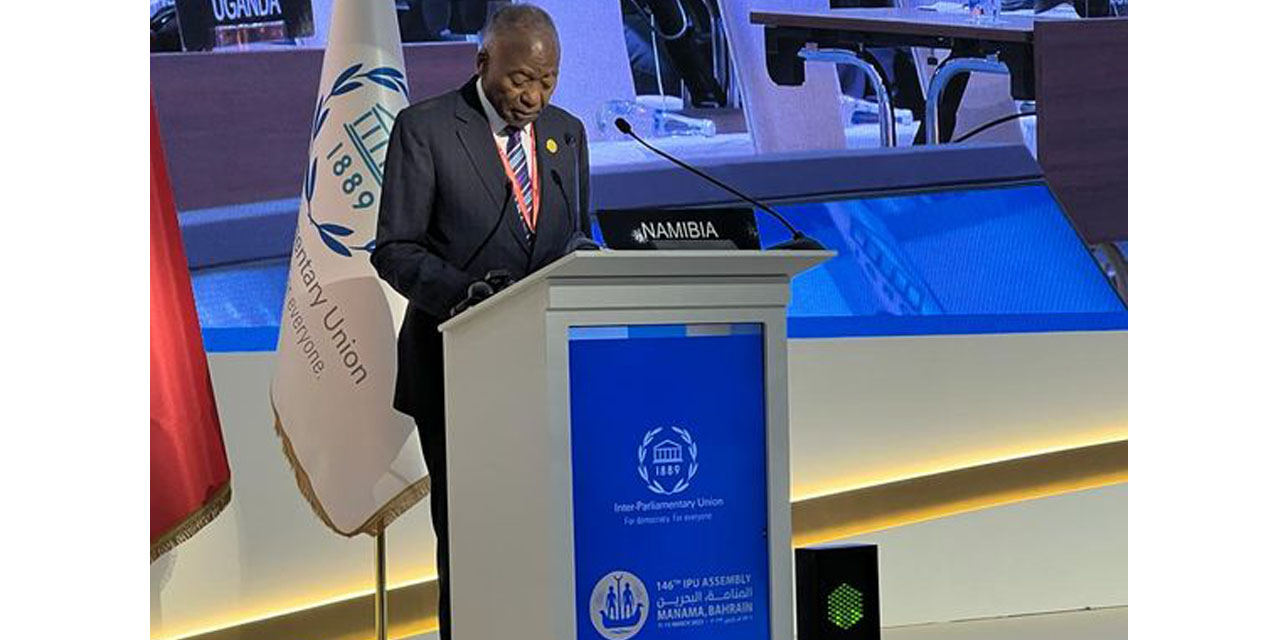Martin Endjala
Speaker of the National Assembly, Peter Katjavivi says he is optimistic that continuous collaborative efforts between the parliaments of Ukraine and Russia will result in a breakthrough for peace after Russia invaded Ukraine on the 24th of February 2022.
The Speaker made the statement during the Inter-Parliamentary Union Assembly and related meetings, held last week, in Manama, Bahrain.
Katjavivi says peace is achievable given the two countries’ willingness to come to one table to discuss meaningful and lasting solutions to the war.
The Inter-Parliamentary Union is a global organization of parliaments that brings together lawmakers to identify international challenges and make recommendations for action, comprising 179 national parliaments and 14 regional parliamentary bodies.
The assembly which was hosted by the Parliament of Bahrain in cooperation with the Inter-Parliamentary Union secretariat was held under the theme “Promoting peaceful coexistence and inclusive societies: Fighting intolerance”.
Over 140 countries were in attendance including parliamentary Speakers and Deputy Speakers. Members of Parliament who accompanied Katjavivi were Victoria Kauma Vice Chairperson of the National Council, Tobie Aupindi, Emelia Nuyoma-Amupewa, Jennifer Van den Heever, Olivia TuyenikelaoHanghuwo, Longinus Iipumbu and Deriou Andred Benson.
Katjavivi who is the Vice-President of the Inter-Parliamentary Union Task Force, on the conflict between Russia and Ukraine stated that the Task Force’s mission is to facilitate political dialogue and promote peacebuilding efforts in compliance with the UN Charter and international law principles such as national sovereignty, territorial integrity, and non-use of force.
As a part of its mandate, the Speaker stressed that the Task Force continues to engage parliaments from both countries and identify areas of convergence to achieve a peaceful resolution to the conflict. The speaker said that he is optimistic that this collaborative effort will result in a breakthrough for peace, and will continue to work diligently with the Task Force towards this goal.
Katjavivi at the same time, outlined Namibia’s legislative interventions aimed at protecting the rights of all individuals without discrimination on any grounds, including race, culture, colour, language, religion, gender, sexual orientation, or political affiliation.
He added that the Namibian parliament has enacted laws such as the Combatting of Domestic Violence Act, the Combatting of Rape Act, and amendments to the Criminal Procedure and High Court Acts, adding that these laws promote human rights and ensure access to justice for all.
“Namibia’s efforts towards promoting peaceful coexistence and inclusive societies are not limited to legislation”.
Meanwhile, the Manama Declaration follows a debate in which a record of 151 parliamentarians pledge to fight inequality through rights-based economic and social policies that put people before profit and the weak before the strong, and that uphold the equality and dignity of every person.
The declaration also urges parliamentarians to implement the Sustainable Development Goals by 2030, leaving no one behind as the best hope for peace, democracy and sustainable development for all.
Furthermore, the Declaration is a message of hope which calls for a more tolerant world where diversity is celebrated, and where every human being is recognized for their contribution to society.
In addition, the Declaration calls for parliamentarians to make hate-motivated acts and all forms of violence linked to religion, belief, xenophobia, racism or intolerance of marginalized groups an offence under the law.
A resolution on cybercrimes was adopted, citing it to be timely, given the increase in cybercrimes worldwide due to a growing reliance on technology and the digitalization of many aspects of life, which accelerated during the COVID-19 pandemic.
The resolution underlines the need for international cooperation to address cybercrimes, as well as to protect global peace, security and economic stability while upholding human rights, including freedom of speech.
The resolution emphasizes the responsibility of parliaments in building a regulatory framework to protect citizens in cyberspace in the same way as in the physical world.
It also notes that cybercrimes may constitute a serious threat to democratic processes, especially interference in elections through cybersecurity breaches or false social media accounts. While also acknowledging that women, young people and children are among the most vulnerable and suffer from the most aggression on the internet.
The resolution is the result of a long consultative process, including a record of 320 amendments received from Member Parliaments, often with opposing views, culminating in a final agreed text, demonstrating the importance and sensitivity of the issue today.
“The Inter-Parliamentary Union resolution and the future United Nations convention should ultimately lead to stronger national legislation to combat cybercrimes”, read the resolution.




